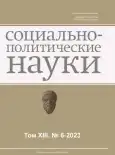Общественный договор: история и современность
- Авторы: Зубов В.В.1
-
Учреждения:
- Финансовый университет при Правительстве Российской Федерации
- Выпуск: Том 13, № 6 (2023)
- Страницы: 31-40
- Раздел: Политические институты, процессы и технологии
- URL: https://journals.eco-vector.com/2223-0092/article/view/626865
- DOI: https://doi.org/10.33693/2223-0092-2023-13-6-31-40
- EDN: https://elibrary.ru/AFFODE
- ID: 626865
Цитировать
Полный текст
Аннотация
В настоящей публикации автор, используя методы анализа, описания, классификации, компаративный подход, а также формально-догматический и казусно-ориентированный методы, проводит детальное изучение договорной теории в ее кросс-темпоральном разрезе, что позволяет установить действительную взаимосвязь между теоретическими изысканиями мыслителей прошлого и имплементацией договорных начал в реальной политической практике. Устанавливается, что многие постулаты основателей договорной теории с течением времени были благоприятно восприняты сторонниками ограниченной государственной власти и так же позитивно оцениваются ими сейчас, что выражается в разработке идеи социального контракта. Проводя обзор текущего состояния ряда национальных политических систем с точки зрения их конституционного строя, автор показывает, что конституционный строй демократических обществ имеет в качестве глубинного основания идею общественного договора. При этом отмечается, что, хотя в самих конституциях или актах конституционного значения ссылка на договорный концепт может не содержаться, данная идея весьма плодотворно выражает производный характер государственной власти от воли, интересов и потребностей общества. В завершающем разделе основной части выдвигается положение, по которому именно демократический режим наиболее приспособлен для имплантации модели общественного договора. Также постулируется, что демократический идеал современности попросту немыслим без представления о государстве как продукте соглашения гражданского общества с публичной властью. В завершении статьи указывается, что конструкция общественного договора с момента ее проработки выдающимися европейскими мыслителями прошла определенную эволюцию, и если ранее общественный договор воспринимался как способ перехода к государственному состоянию в принципе, то теперь он трактуется гораздо шире. Кроме всего прочего, автор обращает внимание на то обстоятельство, что конструкция общественного договора, предполагавшаяся ее авторами как универсальная модель, не применима к некоторым политическим системам ввиду их цивилизационных особенностей.
Полный текст
Об авторах
Вадим Владиславович Зубов
Финансовый университет при Правительстве Российской Федерации
Автор, ответственный за переписку.
Email: zubov305@yandex.ru
ORCID iD: 0000-0001-6446-3221
SPIN-код: 1747-1789
Scopus Author ID: 328437
кандидат исторических наук, доцент, департамент политологии, факультет социальных наук и массовых коммуникаций
Россия, МоскваСписок литературы
- Бенедикт Р. Хризантема и меч: модели японской культуры. СПб.: Наука, 2016. 360 с.
- Вебер М. Политика как призвание и профессия. М.: Рипол классик, 2021. 292 с.
- Гоббс Т. Левиафан. М.: Рипол классик, 2016. 672 с.
- Гроций Г. О праве войны и мира. М.: Ладомир, 1994. 868 с.
- Локк Дж. Сочинения в трех томах. Т. 3. М.: Мысль, 1988. 668 с.
- Руссо Ж.-Ж. Политические сочинения. СПб.: Росток, 2013. 640 с.
- Спиноза Б. Избранные произведения. В 2 т. Т. 2. М.: Гос. изд-во полит. лит-ры, 1957. 728 с.
- Шифрин Э.В. От бесконечности до человека. Базовые идеи каббалы в рамках теории информации и квантовой физики. М.: Книжники, 2018. 240 с.
- Козлова Е.И., Кутафин О.Е. Конституционное право России: учебник. М.: Проспект, 2018. 592 с.
- Марченко М.Н. Теория государства и права: учебник. М.: Проспект, 2017. 656 с.
- Пляйс Я.А., Брега А.В., Шатилов А.Б. и др. Политология: учебник / под общ. ред. Я.А. Пляйса, С.В. Расторгуева. М.: ИНФРА-М, 2023. 414 с.
- Гаман-Голутвина О.В., Бусыгина И.М., Воскресенский А.Д. и др. Сравнительная политология: учебник / под ред. О.В. Гаман-Голутвиной. М.: Аспект Пресс, 2018. 752 с.
- Linz J., Stepan A. Problems of democratic transition and consolidation. Baltimore; London: John Hopkins University Press, 1996. 480 p.
- Горячев Д.А. Именуемость Бога: апофатический и антиномический подходы // Вестник ПСТГУ. Серия I: Богословие. Философия. Религиоведение. 2023. Вып. 106. С. 9–24.
- Рождественская Е.Ю. Социальный контракт в эпоху 90-х // INTER. 2019. № 18. С. 55–79.
- Седых Н.Н. Пределы власти в концепции «Суверена» Томаса Гоббса // Образование и право. 2019. № 4. С. 239–243.
- Филиппов А.Р. Религиозная политика Японии XV–XVII вв. в контексте централизации власти и зарождения реалистического авторитаризма // Социально-политические науки. 2023. Т. 13. № 2. С. 36–43.
- Филиппов А.Р., Новиков О.Г. Теоретические подходы к исследованию общественного согласия // Социально-политические науки. 2023. Т. 13. № 5. С. 13–28.
Дополнительные файлы








